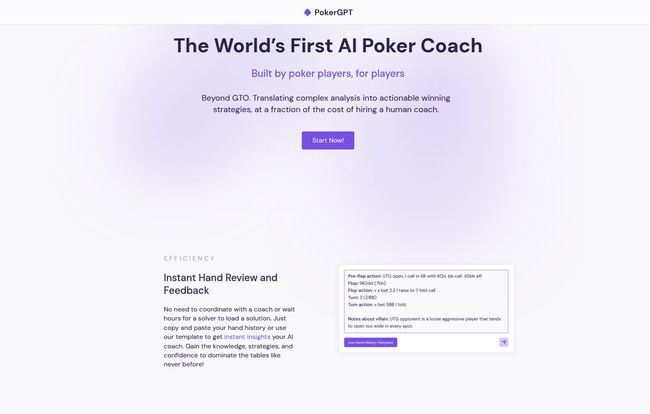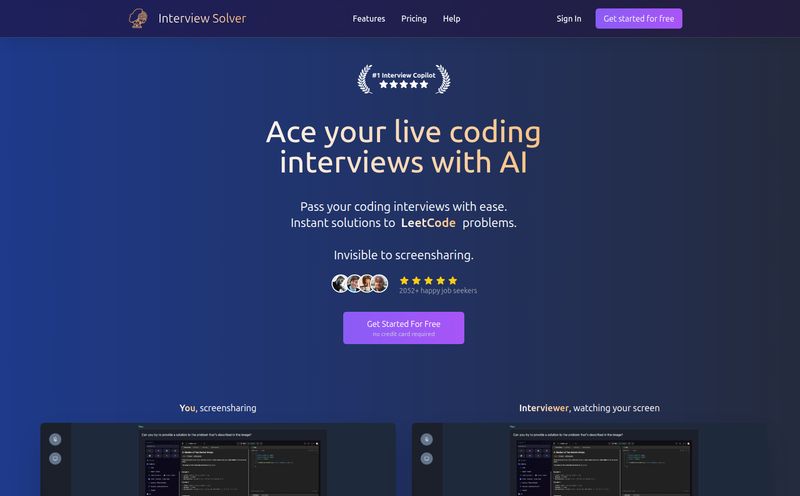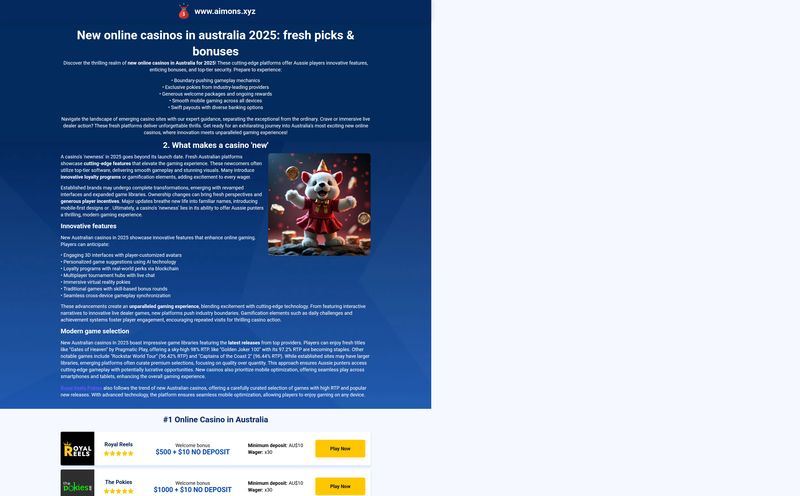I’ve spent more nights than I can count staring at hand histories, my brain feeling like a scrambled egg. You know the feeling. You get stacked in a big pot, and the hand just haunts you. Did I overplay my aces? Was that river bluff just plain stupid? You run it through your head a dozen times, wishing you had a pro sitting on your shoulder to tell you what went wrong. For years, that meant two things: hours grinding away with complex GTO solvers or shelling out some serious cash for a human coach.
It’s a grind. And honestly, it can suck the fun right out of the game we love.
But then, something new popped up on my radar. A tool called PokerGPT, billing itself as “The World’s First AI Poker Coach.” A bold claim, for sure. Built by players, for players, it promises to translate the gobbledygook of high-level poker theory into simple, actionable advice. An AI coach that’s cheaper, faster, and always on call? Okay, you have my attention. But is it just another gimmick, or could this actually be the study buddy we've all been waiting for?
So, What Exactly is PokerGPT?
Let's cut through the marketing fluff. PokerGPT is an AI tool designed specifically for us, the recreational players. The weekend warriors, the online grinders, the folks who love the game but don't have a PhD in mathematics. The core idea is simple: you feed it a hand history—literally just copy and paste the text—and it gives you instant feedback.
It’s not just a basic odds calculator, though. This thing aims to be a proper coach. It analyses your decisions on every street (pre-flop, flop, turn, and river) and explains the why behind the optimal play. The goal is to make learning poker less intimidating and, frankly, more accessible to everyone who doesnt have a bankroll padded for elite coaching.

Visit PokerGPT
The Three Pillars: Speed, Simplicity, and Smarts
PokerGPT seems to hang its hat on three main benefits, which I saw plastered all over their site. Let's break them down because this is where the rubber meets the road.
Instant Feedback on Your Hands
This is the big one for me. I’ve worked with coaches before, and while they're fantastic, there’s always a lag. You send them a dozen hands, you wait a day or two, you schedule a call. With PokerGPT, the feedback is immediate. You can be in the middle of a session, bust out of a tournament on a questionable play, and within 30 seconds, have a complete analysis. That immediate feedback loop is incredibly powerful for learning. It's like touching a hot stove—the lesson sinks in much faster when the consequence is instant.
Beyond GTO: It Speaks Human, Not Robot
If you've ever tried to learn poker seriously, you've heard of GTO (Game Theory Optimal). It's the 'perfect' way to play that makes you unexploitable. It’s also incredibly complex, involving charts, solvers, and a level of math that makes my eyes glaze over. It's like the perfect textbook strategy.
But here's the secret: almost nobody at your local $1/$2 game or in a $10 online tournament is playing GTO. They're playing on feel, they're making mistakes, they're being human. This is where exploitative strategy comes in. It's about adjusting your play to take advantage of your opponents' specific weaknesses. And this is where PokerGPT really impressed me. It doesn’t just spit out the cold, hard GTO line. It considers player tendencies. For example, you can tell it you're up against a “loose aggressive player,” and it will tailor its advice to counter that specific style. It’s the difference between having a physics textbook and having a seasoned mechanic who knows how to get a little extra horsepower out of your specific car.
The AI Coach vs. The Human Coach
So, is it time to fire your human coach? Well, let's not get ahead of ourselves. An AI is a tool, not a replacement for human intuition. I see it as a supplement. Here’s a quick rundown of how they stack up:
| Factor | PokerGPT (AI Coach) | Human Coach |
|---|---|---|
| Cost | Significantly more affordable. | Can be very expensive ($50 - $500+/hour). |
| Availability | 24/7, on-demand. | Requires scheduling. |
| Feedback Speed | Instantaneous. | Delayed (hours or days). |
| Psychological Aspect | None. It can't tell if you're on tilt. | Can provide mental game coaching and read your emotional state. |
| Nuance | Analyzes the data you provide. | Can pick up on live tells, table dynamics, and context the AI might miss. |
The Million-Dollar Question: What's the Price?
Here’s where things get a bit mysterious. As of writing this, there's no clear pricing on the PokerGPT website. In fact, the links that look like they might lead to a pricing or subscription page currently lead to a '404 Page not found' error. This could mean a few things. They might be in a beta phase, still figuring out their pricing model, or maybe preparing for a big launch. My guess? We'll probably see a subscription model, maybe with a free tier to analyze a few hands per day. But for now, your guess is as good as mine.
Potential Downsides to an AI Overlord
I wouldn't be doing my job if I didn't talk about the potential pitfalls. No tool is perfect, and relying too much on an AI has its own set of risks.
Is It a Crutch for Your Brain?
My biggest concern is that a tool this easy to use could discourage independent thought. If you can get an instant answer every single time you're confused, you might stop trying to work through the problem yourself. The best players have an intuitive feel for the game that comes from thousands of hours of struggle and critical thinking. My advice: use PokerGPT to check your work, not to do your homework for you. Analyze the hand yourself first, come to a conclusion, and then see what the AI has to say.
The Missing Human Element
Poker is a game of incomplete information played by emotional, irrational humans. An AI can't read a player's nervous twitch when they make a big bet. It can't feel the shift in momentum at the table after a huge pot. It doesn't understand your personal history with a specific opponent. A good human coach can factor in all these intangibles. That nuanced, almost psychological level of coaching is something AI, at least for now, just can't replicate.
So, Who Is PokerGPT Actually For?
In my opinion, PokerGPT finds its sweet spot with a very specific group of players: the serious recreational player. You're not trying to become the next Phil Ivey, but you want to stop losing money to the regulars in your home game. You're the online player who is stuck at the micro or low stakes and wants to plug your leaks without breaking the bank.
If you're an absolute beginner who doesn't know a flush from a straight, this might be a bit too much. And if you're a high-stakes pro, you probably already have more advanced tools and a network of peers for analysis. But for that massive group of players in the middle? This could be a genuine game-changer.
My Final Verdict on PokerGPT
Look, the poker world is full of training sites, courses, and software all promising to make you a winner. Most of them are either too complex or too basic. PokerGPT feels different. It strikes a fascinating balance between sophisticated analysis and user-friendly design.
It’s not a magic pill. It won’t turn you into a poker god overnight. But it is an incredibly powerful, accessible, and potentially very affordable tool for getting better. Think of it as a sparring partner that's available 24/7, never gets tired, and has a deep understanding of poker theory. Used correctly—as a guide, not a crutch—I genuinely believe PokerGPT can help a lot of players plug their leaks and start playing with more confidence.
Frequently Asked Questions about PokerGPT
- Is PokerGPT better than a human poker coach?
- It's different. It's better for instant, data-driven feedback on specific hands. A human coach is better for psychological coaching, live reads, and developing a long-term, personalized strategy. Many players could benefit from using both.
- What is the difference between GTO and exploitative strategy?
- Think of GTO (Game Theory Optimal) as the 'perfect' baseline strategy that's impossible to exploit. Exploitative strategy involves deviating from GTO to take advantage of the specific mistakes your opponents are making. PokerGPT helps with both, which is a major strength.
- How much does PokerGPT cost?
- As of now, the pricing is not publicly available on their website. It appears to be in a launch or beta phase. We expect a subscription model in the future, but this is just speculation.
- Can I use PokerGPT for live poker hands?
- Yes, absolutely. You just need to be able to recall the action (who bet, how much, on what street) and type it into the tool in a simple format. It's great for analyzing key hands after a live session.
- Do I need to be a tech wizard to use it?
- Not at all. The interface is designed to be simple. If you can copy and paste text, you can use PokerGPT. The explanations are given in natural, easy-to-understand language.
The bottom line is that learning poker just got a whole lot more accessible. Whether it's the future of coaching remains to be seen, but it's a powerful new player at the table. And in poker, you always want to have every weapon you can in your arsenal.
Reference and Sources
- PokerGPT Official Website: While some pages are down, the main homepage can be viewed at their official domain. (Note: A specific URL was not provided beyond the general brand name, so a direct link isn't possible, but users can search for "PokerGPT AI Coach").



